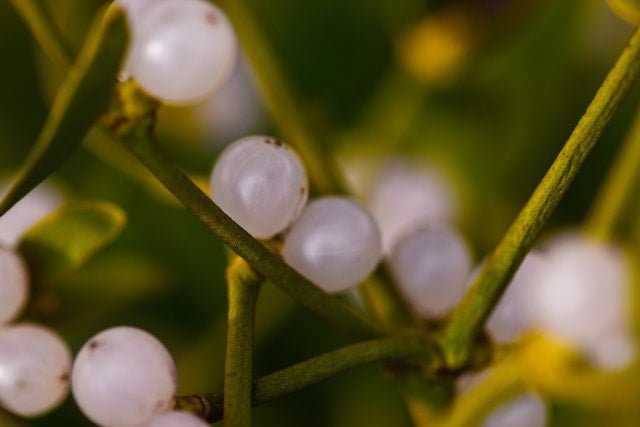Mistletoe extract can prevent diabetes, soothe respiratory disorders, calm the nervous system, lower blood pressure, promote good sleep, and increase immune system activity. It also reduces snoring, menstrual pain, and irritability.
Injections of European mistletoe (Iscador) might decrease cancer in people with a specific type of lung cancer. But it doesn’t seem to improve survival or help treat head and neck cancer.
It Reduces Stress
Mistletoe is known for being associated with romance and Christmas, but it can also help reduce stress. Several studies have shown that it has anti-stress and anxiolytic effects, helping to treat symptoms such as depression and anxiety.
Mistletoe extracts can be administered in several ways, including as an injection under the skin or into a blood vessel. It is commonly used as an alternative cancer treatment in Europe, where it is sometimes given to patients under the guidance of a trained oncologist.
In one study, a mistletoe extract stimulated the immune system and killed cancer cells in lab tests. It is believed to work by blocking the growth of new blood vessels, which cuts off the fuel supply to tumors.
While these studies are promising, it is essential to remember that mistletoe is not regulated like prescription drugs in the United States. As such, it is important always to read a supplement’s label and avoid taking it if you take medications that can interact with it.
It Helps You Sleep
Mistletoe has been used since ancient times to treat ailments like headaches and seizures. It is believed to have stimulating properties that stimulate the body’s natural defense system and improve circulation. Mistletoe is often combined with other herbal remedies to create an effective treatment plan.
In addition to reducing stress, mistletoe extracts may also help you sleep. This is because it is believed to have anti-anxiety actions, which can relax the muscles in your body and calm the mind.
Studies show that one of the mistletoe extract benefits is that it can boost the immune system, which can help your body fight off cancer cells. Additionally, it has been shown to have anti-inflammatory and antioxidant effects.
While mistletoe has been studied for its potential health benefits, more research is needed to confirm these claims. Talking to a healthcare professional before taking any supplements, including mistletoe, is essential. Dietary supplements aren’t regulated the same way drugs are, so choosing quality products that third parties have tested for safety and purity is important. In addition, always check product labels for any potential interactions with other medications and supplements you take.
It Helps You Concentrate
Mistletoe is a semiparasitic plant that grows on many types of trees, including pine, oak, and maple. It’s often used as a holiday decoration, symbolizing love and peace. However, it’s also been used for centuries in traditional herbal medicine. It has been shown to have anti-tumor, antibacterial, analgesic, and immune-stimulatory properties. It’s thought that viscotoxins, polysaccharides, and lectins are the active compounds that provide mistletoe’s medicinal properties. While several in-vitro studies have demonstrated that mistletoe may help treat cancer, more human clinical trials are needed. Injections of mistletoe are commonly used in Europe to treat cancer. Still, the FDA doesn’t approve them in the U.S. These injections are administered under the skin or directly into a tumor.
Talk to your oncology team if you’re interested in trying mistletoe extract. They can help you find evidence-based complementary treatment options. When taking dietary supplements, always follow the instructions on the label and avoid overdosing. Also, remember that the FDA doesn’t regulate supplements, so look for those that have been third-party tested by organizations.
It Lowers Your Blood Pressure
Mistletoe is a natural anti-inflammatory that can help ease the pain of rheumatoid arthritis, and it’s also been shown to lower blood pressure. It may even help prevent heart attacks. Some research suggests that a flavonol in mistletoe called Vescovidin inhibits the inflammatory factor PAF, contributing to plaque formation and artery clogging.
Its nerve-soothing properties calm the respiratory system and reduce irritation in the bronchial tubes, which can cause coughing fits. Mistletoe can also help relieve wheezing caused by asthma and soothe a sore throat.
It’s been used to treat fatigue associated with cancer treatments, such as chemotherapy, radiation therapy, and menopausal symptoms. It can also boost the immune system and help prevent osteoporosis, especially post-menopausal women. One study found that mistletoe was able to improve the quality of life for cancer patients, as well as their survival. Other studies have linked it to apoptosis and tumor shrinkage in cancer cells. It can also help reduce side effects from chemotherapy, such as nausea, vomiting, and diarrhea.
It Helps You Feel Better
The mistletoe (Viscum album) popularly used as a Christmas/holiday decoration — for kissing under it to show romance — differs from the European variety widely used in traditional herbal medicine. The latter has a long history of use in helping with cancer, improving cardiovascular health, managing skin conditions, alleviating depression/anxiety, and balancing hormones.
Research suggests that mistletoe may also help to improve the quality of life in people with cancer, including reducing chemotherapy-related fatigue. In one study, participants who received a prescription mistletoe product called Iscador had improved cancer-related fatigue and overall functioning compared to those who didn’t receive the injections.
Research on mistletoe’s benefits for cancer patients has mainly been done in lab settings or using animal models, and more human trials are needed to confirm the results. Talking with your oncology team before starting a new supplement, including mistletoe extract, is essential. This is especially true if you take medications for high blood pressure or heart disease. These drugs might interact with European mistletoe and cause blood pressure to fall too low.




